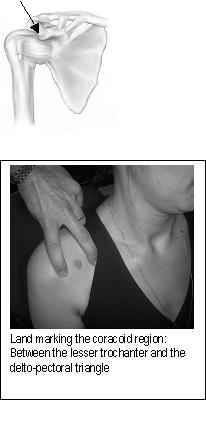Validated Adhesive Capsulitis Test #2
Reference:Carbone S, et al. Coracoid pain test: a new clinical sign of shoulder adhesive capsulitis. Int Orthop. 2010 Mar;34(3):385-8.
This study involved over 500 subjects with various shoulder issues with 150 asymptomatic subjects.
The purpose of the study was to determine the sensitivity and specificity of tenderness of the coracoid region with respect to adhesive capsulitis.
The coracoid region palpation test was considered +ve if pain was more severe than 3 points (VAS scale) with respect to the AC joint and the anterolateral subacromial area.
The coracoid palpation test was +ve in …
- 96.4% of patients with adhesive capsulitis
- 11.1% of patients with rotator cuff tear
- 14.5% of patients with calcified tendonitis
- 6.2% of patients with glenohumeral OA
- 10.6% of patients with AC joint arthropathy and
- 2% of the asymptomatic subjectsWith respect to the other four shoulder conditions, the coracoid palpation test had a sensitivity of 0.96 and a specificity of 0.88 for diagnosing adhesive capsulitis (which are considered excellent!)
With respect to controls, the coracoid palpation test had a sensitivity of 0.99 and a specificity of 0.98 (which are considered very very excellent!)
So what can we learn from these studies?
The criteria for diagnosing adhesive capsulitis include:
- Pain in the shoulder, which comes on slowly
- Pain felt at the insertion of the deltoid
- Inability to sleep on the affected side
- Restriction of both active and passive ROM
- +ve coracoid palpation test (based on this study)
- +ve lateral rotation test (see previous study) Posted on: March 22, 2012
Categories: Shoulder


